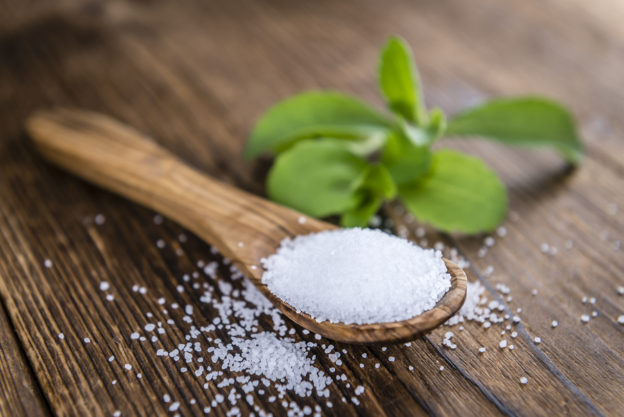By David Blyweiss, M.D., Advanced Natural Wellness
April 5, 2017
- Are sugar-free beverages your best choice?
- How no-calorie sweeteners sabotage your gut
- Raise your glass high… and drink to your health
Swapping your sugary soda for a sugar-free iced tea or diet cola might sound like a smart decision. But drinking beverages labeled “sugar-free” won’t do anything to help you lose weight, prevent diabetes or make you healthier.
You see, most sugar-free drinks contain artificial sweeteners.
These “fake” sugars elicit the same response from your body that real sugar does. But they don’t provide any calories. There’s not an ounce of energy in them. This tricks your taste buds – and your body – into thinking a big dose of sugar is on its way.
This mismatch between an intensely sweet sensation and a lack of following calories creates a big problem. It triggers intense sugar cravings that send your appetite into overdrive.
Ultimately, the more sugar-free beverages you drink, the more likely you are to over stimulate your “sweet taste” receptors, shun nutritious food choices and over eat foods that are decidedly unhealthy.
Open your arteries, improve blood flow for a new health miracle...
Did you know your circulatory system has over 60,000 miles of arteries, veins and other blood vessels, if stretched end to end?
But as you age, your blood vessels undergo changes, which may cause them to stiffen, thicken and get clogged.
GOOD NEWS! Doctors have now identified a “Miracle Molecule” inside your arteries that helps OPEN your arteries and IMPROVE blood flow.
It’s what Dr. Valentin Fuster calls it, "One of the most important discoveries in the history of cardiovascular medicine."To you, that means...
- Healthy blood pressure
- Sharper mind and memory
- Skyrocketing energy and muscular strength
- Increased pleasure and passion in the bedroom
- Improved circulation to every cell and organ in your body
Go here to discover a new natural way to significantly boost the levels of this miracle molecule in YOUR body NOW!
As if this isn’t bad enough, there’s much more to the story that you absolutely must know about.
Artificial Sweeteners Sabotage Your Gut Bacteria
The microbes in your gut aren’t just a bunch of bacteria that help break down and digest the foods you eat. They’re also a gauge of your health.
If your gut is overrun with unhealthy bacteria, it can contribute to heart disease, bowel problems, reduced brain function and many other health concerns. In particular, there’s a very distinct link between “bad” gut bacteria, obesity and diabetes.
Well, here’s the thing. Synthetic sweeteners alter the composition of your gut bacteria.
They reduce the number of good microbes and increase the population of others that have a negative effect on your metabolism. This can lead to abnormally high blood sugar levels.
Are You Suffering From...
- Love handles and a pot belly
- Romance that isn't what it used to
- Forgetfulness and inattention
- Low (or no) strength and endurance
- A sex drive that's shifted into neutral...or worse
If so...you may have Mature Male Burnout. Click here to discover more about this unique condition and what you can do about it.
Plus, the same unhealthy microbes that flourish in the presence of synthetic sweeteners are very efficient at pulling energy from your food and turning it into fat. That’s the last thing anyone wants.
Even worse, there’s a direct link between your gut microflora and the food cravings you have. It’s called the “gut-brain axis”.
Simply put, the bacteria in your gut have the ability to activate nerve signals that link your stomach and your brain. This can have a direct influence the types of food you crave.
If you don’t obey, they send out signals that make you feel distressed until you satisfy their craving. These microbes can even hijack your vagus nerve, which regulates your eating behavior and body weight.
It’s no wonder people who drink artificially sweetened beverages are more likely to eat larger meals, gain weight and end up with diabetes and insulin resistance!
Drink to Your Health
Now, no-calorie sweeteners are targeted toward people who want to lose weight, maintain healthy blood sugar levels and lead a healthy life. But the science is clear: These fake sugars don’t do anything of the sort.
Additionally, they pose multiple health threats like headaches, seizures, insomnia, mood disorders and neurological problems.
It’s a travesty that people throughout the U.S. who indulge in artificially sweetened beverages are suffering these side effects while becoming obese, diabetic and addicted to food.
So here’s a tip. Raise your glass high and drink to your own good health by making your own beverages.
Unsweetened tea is always a good choice. So is good, old-fashioned water. If you like a little fizz, try a sparkling mineral water. Then, add a slice of fruit or small splash juice to give it a naturally sweet flavor.
But if your taste buds require a sugar boost, the only sugar replacement I recommend is natural stevia. It’s a safe, calorie-free sweetener that doesn’t carry any of the risks you find with refined sugar or artificial sweeteners.
And unlike the alternatives, it has a positive effect on your weight, blood sugar and insulin response. You can add it to your iced tea, home-made lemonade, juices, and even your coffee. But beware! Stevia is 300 times sweeter than sugar, so it takes just a pinch to sweeten up a beverage.
SOURCES:
Borges MC, et al. Artificially Sweetened Beverages and the Response to the Global Obesity Crisis. PLoS Med. 2017 Jan; 14(1): e1002195.
Suez J, et al. Non-caloric artificial sweeteners and the microbiome: findings and challenges. Gut Microbes. 2015; 6(2): 149–155.
Suez J, et al. Artificial sweeteners induce glucose intolerance by altering the gut microbiota. Nature. 2014 Oct 9;514(7521):181-6.
Joe Alcock, et al. Is eating behavior manipulated by the gastrointestinal microbiota? Evolutionary pressures and potential mechanisms. Bioessays. 2014 Oct; 36(10): 940–949.






